
NORTH WARWICKSHIRE AND SOUTH LEICESTERSHIRE COLLEGE


NORTH WARWICKSHIRE AND SOUTH LEICESTERSHIRE COLLEGE


To create success through learning







1 Purpose
2 Context and Place
3 Approach to developing the Accountability Statement
4 Contribution to National, Regional and Local Skills Priorities
5 Local Needs Duty Self-Assessment
6 NWSLC Corporation Statement
7 Supporting Documentation


North Warwickshire and South Leicestershire College (NWSLC) is a medium-sized general further education provider serving the immediate communities of Oadby and Wigston, Hinckley and Bosworth, North Warwickshire and Nuneaton and Bedworth. Every year NWSLC supports more than 10,000 people to gain skills and qualifications that positively change their lives and enable them to progress in their individual education journeys or directly into employment.
As a general further education college, our focus is on ensuring that we provide appropriate pathways to the wide variety of students that require training or upskilling. Consequently, our curriculum offer is broad and accessible across the regions that we serve. What sets NWSLC apart from others is the investment we continue to make in our student experience ensuring that our students leave us with not only the technical skills to move on with their next steps, but also the life skills to make a meaningful contribution to society.
The NWSLC Strategic Plan sets out our mission and key purpose in providing high quality teaching and learning, preparing our students and apprentices to meet skills demands and our ambition to meet skills demands through a collaborative and creative curriculum.
We lead a range of innovative industry collaborations such as the MIRA Technology Institute (MTI) and the Centre for Logistics Education and Research (CLEAR). The MTI is a unique collaboration between further education, higher education and employers to lead on innovation and training in the automotive sector. CLEAR brings a unique focus to meeting the needs of the ever-growing logistics and supply chain sector by providing bespoke training for supply chain and logistics companies based regionally and nationally.
We will support the learning and skills development of individuals across all our communities by partnering with businesses to raise productivity and support growth locally, regionally and nationally
The NWSLC Accountability Statement was last updated in October 2023 to respond to the publication of Local Skills Improvement Plans in the West Midlands, Warwickshire and Leicestershire. At that time, we outlined a set of objectives to accomplish during the 2023-24 academic year. This coincided with the launch of the new, three year NWSLC Strategic Plan in 2023.
As a result of these strategies, during 2023-24, we have:
• Implemented 5 new T level pathways, Health, Business, Digital, Childcare and Engineering.
• Delivered T Level foundation programmes in Media, Business and Digital.
• Re-designed and re-sequenced the delivery of our apprenticeship curriculum, which ensures effective development of new knowledge, skills, and behaviours.
• Developed bespoke programmes for employer partners in Electrification, Hydrogen Fuel Cell technology and Robotics.
• Engaged employer, community, civic and / or education partners in the design and / or implementation of our curriculum in all curriculum areas.
• Developed a NWSLC wide Respect programme that focuses on students and apprentices developing their skills for work across three themes, Respect yourself and others, Respect the environment and Respect your future.
• Provided experiences of work for 95% of full-time students.
• 600 students who have had competition-based skills development activity embedded in their programme.
• 172 students engaged in external skills competitions.
• Been placed as the highest performing NWSLC for Foundation skills for World Skills UK
• Held four staff development days including extended opportunities for our practitioners to update their vocational and industrial knowledge and skills.
• Worked collaboratively with Coventry University to develop a collective response to employer needs and begun developing student career pathways from level 1 to 6.
• Planned the launch of higher technical qualifications in September 2025.
Leaders and managers at NWSLC engage frequently and effectively with employers and other relevant stakeholders to understand the skills needs of the local, regional and national economy. As a result, NWSLC’s curriculum is planned accordingly.
For example, through its education programmes for young people, NWSLC is engaged in a large range of civic, employer, education and community partnerships and programmes to meet local, regional and national skills demands. NWSLC leaders and managers engage effectively with employers and stakeholders to understand skills needs and plan the curriculum accordingly. Employers and stakeholders are engaged in the design and implementation of the curriculum and leaders and managers ensure the curriculum is taught effectively to enable students to learn the skills they need.
Meeting the local, regional and national demand for skilled construction employees, NWSLC provides construction programmes via dedicated and specialist facilities at its Harrowbrook and Wigston Campuses. NWSLC works with construction employers such as Winvic and BAM Construction to design and implement the curriculum.
The skills demand of Leicester and Leicestershire’s creative and cultural hub is created by over 200 businesses in Leicester’s Cultural Quarter and is recognised by the East Midlands Chamber and their plan (LSIP) to hold a Sector Accountability Panel for Creative and Cultural skills. NWSLC contributes to meeting this skills demand through its dedicated Leicestershire based creative arts and media campus in Hinckley and through its media programmes for young people in Wigston. NWSLC has long standing relationships with employers such as Nuneaton Museum and Art Gallery, Nuneaton Library, George Eliot Hospital in Nuneaton, the Atkins Building Art Gallery in Hinckley and Wincanton, who engage in steering NWSLC’s creative curriculum.
Employers and stakeholders are involved successfully in the design and implementation of the curriculum to prepare students for future education, employment or work.
For example, NWSLC recognises the need (nationally) to improve adult skills to support individuals to access and progress in work and to contribute to the productive growth of the economy. Analysis of local market intelligence demonstrates that the local residences are predominantly only qualified to level 1 with many residents holding no formal qualifications. The number of residents holding qualifications at level 3 and above is below the regional and national average.
NWSLC has long standing relationships with employers such as Leicestershire Police, West Midlands Police, University Hospital Coventry and Warwickshire, Coventry and Warwickshire Partnership NHS Trust, George Elliot Hospital, Deli France, Cummings as well as various care homes, schools and nurseries who engage in steering NWSLC’s curriculum. NWSLC has a particularly successful relationship with six employers who provide internships for students with SEND who are engaged in our supported internships programme. These employers include Nuneaton Signs, Asda and Tesco.
NWSLC Corporation membership during 2023-24 was experienced and knowledgeable, demonstrating a broad skills base with particular emphasis on further and higher education, local authority leadership, regional support agencies, local employers and finance. The NWSLC Board of Governors represents NWSLC students’ interests in skills related external groups, meetings or at employers in a range of fields, including local hospital trusts, voluntary sector advisory boards, industry guilds, national logistics companies, partner universities, partner local authorities, national employers with head quarters in the region, and the Institute for Apprenticeships and Technical Education.
NWSLC has a diverse distance learning offer which is continually updated to address skills gaps both regionally and nationally and to provide adults with flexible access to education and training which will support progression into and / or within work. This includes a breadth of short continuous professional development courses across the sectors of Health and Social Care, Child Development, Environmental Conservation, Engineering, Digital Retailing and Wholesaling, Warehousing and Distribution, Sport, Leisure and Recreation, Direct Learning Support, Preparation for Work, Accounting and Finance, Administration and Business Management.
The successful Multiply adult numeracy programme is deeply rooted in our commitment to addressing the pressing issue of low numeracy skills among adults in our local and regional communities. Through collaborative partnerships with employers and innovative approaches to education, we aim to equip students with the numeracy skills essential for success in today’s workforce.
By directly engaging with employers like Delifrance and the George Eliot Hospital, we ensure that our interventions are tailored to meet the specific needs of our students and align with the demands of the job market.
In 2024-25, NWSLC will implement skills boot camps initially in three fields. These are Step into Teaching in Leicester; Sustainable Healthcare for All in the West Midlands and Net Zero for Business also in the West Midlands.



NWSLC leaders and managers are clear how their curriculum contributes to skills needs and ensure that the curriculum is planned and taught effectively, so that students and apprentices learn the skills they need.
For example, apprenticeship standards offered by NWSLC in 2023-24 continued to support and service the training needs of the wide range of small and medium sized businesses across north Warwickshire and south Leicestershire. A range of small to medium size construction companies were supported through the provision of apprenticeship standards in bricklaying, carpentry and painting and decorating. Whilst business needs of other smaller employers were met through NWSLC’s wider apprenticeship curriculum covering hairdressing, customer service, business administration and accountancy.
NWSLC has worked with employers and employer representative bodies to both impact the curriculum and provide support in staffing needs. For example, the International Powered Access Federation (IPAF) provided positive feedback on the newly developed Lift truck and Powered Access curriculum plans. NWSLC continues to work with larger employers in providing apprenticeship training such as Jungheinrich, Toyota, Summit and Sunbelt.
NWSLC assesses its performance as strong in terms of making a contribution to meeting skills needs.
From June 2022, governing bodies of institutions within the further education sector have a duty to comply with a new section 52B of the Further and Higher Education Act (FHEA) 1992 to review provision in relation to local needs as proposed in the Skills and Post-16 Education Bill.
NWSLC has implemented a process to meet this statutory duty by increasing the local knowledge and expertise of Corporation members to review NWSLC’s provision in relation to local, regional, and national skills demands. NWSLC Corporation members have responsibilities to review and approve NWSLC’s strategic, financial and curriculum planning.
In late 2023-24, NWSLC launched a Skills Needs Advisory Board. This board has a focus on direct consultation with local, national and regional employers to inform the strategic direction set by the NWSLC Corporation in relation to skills responsiveness.
NWSLC Corporation has included the provisions of the Further and Higher Education Act Skills Act (FHEA) and Department for Education (DfE) Statutory guidance in the Scheme of Delegation and relevant activities are included within the Corporation’s Annual Business Plan.
NWSLC Corporation provides the appropriate steer and challenge to NWSLC senior leadership team in the production of the accountability plan and setting of strategic aims/objectives. This has been added to NWSLC Corporation’s schedule of work.
NWSLC operates across a large geographical area with a total of seven campuses with main sites in Wigston, Nuneaton, Hinckley town centre and a further specialist construction centre on the outskirts of Hinckley known as Harrowbrook Campus. In addition, NWSLC has several specialist centres in partnership with industry and other educational providers.
The MIRA Technology Institute (MTI) is a purpose built £9.5m Campus on the MIRA Technology Park, which focuses exclusively on the emerging technology in the mobility sector in partnership with HORIBA MIRA and three university partners. NWSLC operates a sixth campus in Coventry, the Digital Skills Academy, with a focus on escalation of digital and maths and English skills for people in Coventry, Nuneaton and Bedworth and the wider West Midlands region. NWSLC’s seventh and newest campus, the new Centre for Logistics, Education and Research (CLEAR) was completed in 2021-22.
CLEAR is a unique research, innovation, education and training facility based at Magna Park, Lutterworth, the largest distribution park in Europe. NWSLC, Wincanton PLC and GLP are collaborating to deliver a ‘one-stop-shop’ for boosting success in supply chain and logistics.
NWSLC currently serves the districts of Blaby, Oadby and Wigston and Harborough and the boroughs of Nuneaton and Bedworth, North Warwickshire and Hinckley and Bosworth. Crossing the boundaries of the East and West Midlands regions, NWSLC has developed a dynamic curriculum that effectively meets the priorities of both the Leicester and Leicestershire Local Skills Improvement Plan and the West Midlands and Warwickshire Improvement Plan.
NWSLC also works with the West Midlands Combined Authority (WMCA), Colleges West Midlands and the coalition of councils, combined authorities, universities and businesses known as the ‘Midlands Engine.’
Our student community is as diverse as the communities in which our campuses are located.
NWSLC has a comprehensive distance learning offer which is continually updated to provide adults with flexible access to education and training which enables progression into, or within, employment to address both regional and national skills gaps. In 2023-24, this is predicted to provide access to training for over 5000 adults across the sectors of digital skills, health, social and community care, health and wellbeing, sustainability, workplace development, business and leadership.
Total number of students on campus: 1,632 of which 1,041 are aged 16-18
Wigston Campus is a general further education campus offering a range of provision from foundation to higher education. The campus also has a growing Elective Home Education Provision (EHE). Most students enrolled at this campus live within a three-mile radius of the campus. Locations outside this area are mainly serviced by NWSLC provided transport and include Broughton Astley, Enderby and Blaby and the Market Harborough route, servicing Kibworth, Oadby and Wigston.
Main Partner Schools:
Wigston Academy • South Wigston High School • Thomas Estley School
Countesthorpe School • Tudor Grange Samworth Academy
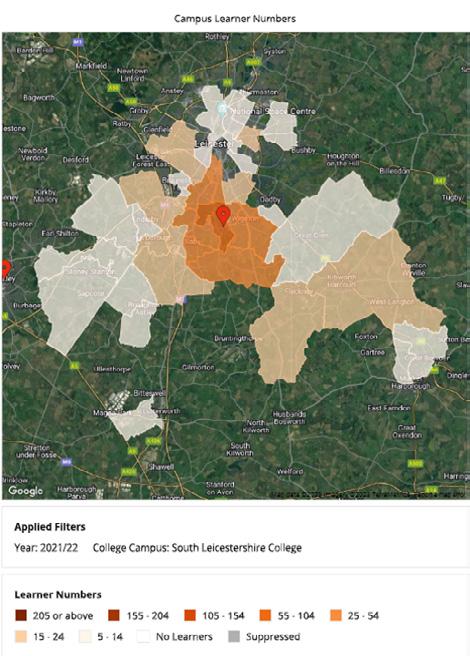
Within the Wigston catchment area, Leicestershire County Council, as the local authority, oversees eight areas including Blaby, Charnwood, Harborough, Hinckley and Bosworth, Leicester City, Melton, Northwest Leicestershire and Oadby and Wigston; each of which has its own local council. NWSLC recognises the importance of understanding the travel-to-work patterns in the region with many people living and working in Leicester and Leicestershire. The working age population (16-64) in the region is projected to grow at 7% between 2020 and 2030. There are areas of demographic differences between Leicester and Leicestershire, with Leicester having a relatively young population and Leicestershire having an older population.
Total number of students on campus: 823 of which 443 are aged 16-18
The Hinckley Campus is a specific creative industries-based facility offering courses from Level 1 to higher education, the map shows that the concentration of students who attend this campus travel from Earl Shilton, Barwell and Hinckley South.
Main Partner Schools:
Redmoor Academy
Hinckley School
Hastings High School
Hartshill Academy
Heath Lane Academy

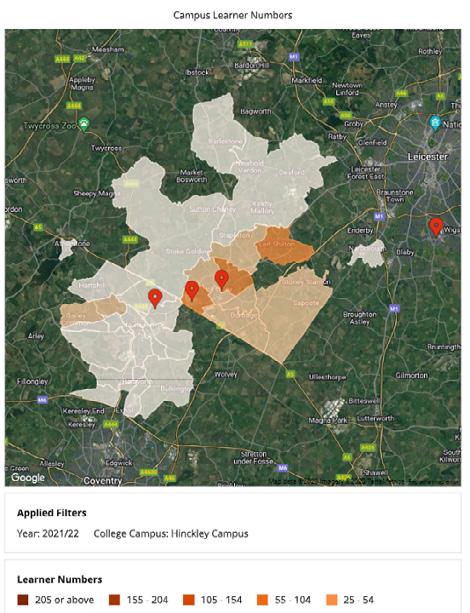
Total number of students on campus: 354 of which 128 are aged 16-18 years.
Harrowbrook Campus is a specialist facility for construction trades and the wider built environment alongside a national provision in forklift truck and powered access engineering maintenance. This campus attracts students on to 16-19 study programmes and apprenticeship provision mainly from Hinckley and Nuneaton. This is the only provision of its kind in the area.
Main Partner Schools:
St Thomas Moore School • Redmoor School • Hinckley School
Heath Lane Academy • Hartshill Academy

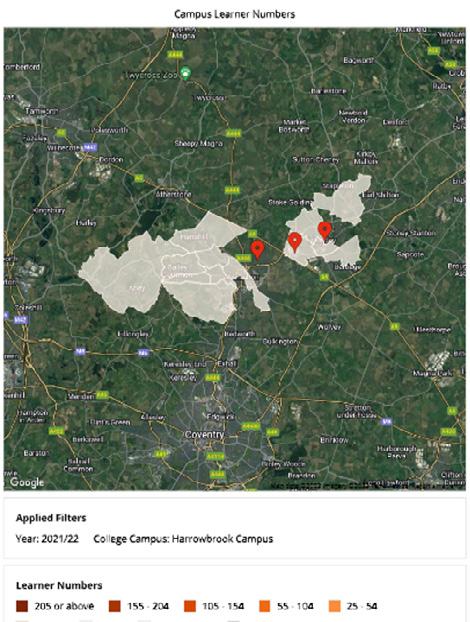
Total number of students on campus:
2,898 of which 1,394 are aged 16-19
Nuneaton campus is a general further education campus offering a range of provision from foundation to higher education. The campus also supports a growing number of pupils who are electively home educated and study 14-16 GCSE programmes at the Campus. NWSLC also provide a small provision for 14-16 pupils who are at risk of, or have been permanently excluded from school.
Main Partner Schools:
Hartshill Academy • George Elliot Academy • Higham Lane School
Nicholas Chamberlain School • The Hinckley School
Overall student numbers have grown steadily over the last three years.
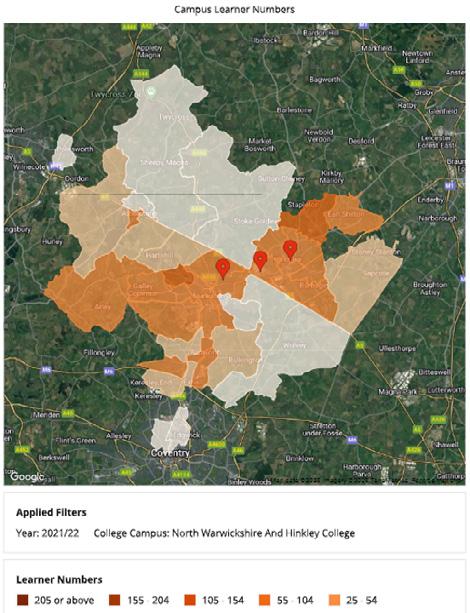
The Nuneaton Campus and stakeholders within its surrounding area collaborate closely with the West Midlands Combined Authority, which compromises 17 local councils. In addition, NWSLC maintains communication with the three Chambers of Commerce , namely Coventry and Warwickshire Chamber of Commerce, Greater Birmingham Chambers of Commerce and the Black Country Chamber of Commerce.
The number of people with higher level qualifications (Level 4 and above) within the local demographics is generally lower than the national average.
The NWSLC Nuneaton Campus has been renovated and updated in 202223 and 2023-24 to ensure the campus is more environmentally sustainable and appropriately resourced to meet the regions’ skills needs. By the start of the 2024-25 academic year, the campus will have:
• Increased capacity in electrical installation tuition facilities.
• New curriculum specific facilities in digital, business and health care, including a hospital ward training environment.
• New engineering training facilities.
• Solar powered energy use and air source pump heating.


This Accountability Statement has been developed from our own curriculum design, stakeholder engagement, and collaborative efforts through initiatives such as the Skills Accelerator programme and the Local Skills Improvement Fund which is designed to facilitate a region wide response to the Local Skills Improvement Plans.
Collaboration across further education
These endeavours have fostered meaningful partnerships with other regional further education providers that include Leicester College, Loughborough College, SMB Group, Halesowen College, Warwickshire College Group, Coventry College, and Solihull College. Engagement in these projects has empowered NWSLC and its partners to enhance their capacity, enabling NWSLC to proactively address local skills demands and emerging priorities. Key developments include new provision surrounding mobility electrification, hydrogen fuel cell technologies, digitisation and sustainability.
NWSLC received recognition of its effective collaborative approach across further education when it received the East Midlands
Chamber of Commerce award for Excellence in Collaboration 23/24.
This was a direct result of the successful delivery of the Strategic Development Fund decarbonisation of transportation project which saw the development of a regional approach to addressing employer need in this priority skills area. NWSLC intends to build on this model and adopt a similar approach to current and future projects which require a collaborative response to addressing the needs of the Local Skills Improvement Plans.
NWSLC is a member of Colleges West Midlands, a collaboration of 18 individual further education colleges who work in partnership to support skills development across the region. Colleges West Midlands has a mandate to raise the technical skills of young people and adults
in full-time education, upskilling in the workplace, undertaking an apprenticeship, or pursuing higher education.
NWSLC enjoys strong relationships with local schools across the regions through its 14-16 curriculum.
The West Midlands and Warwickshire Local Skills Improvement Plan (LSIP) centres around two critical themes: digital skills and green skills, along with the associated leadership and management capabilities specific to the region. Additionally, the plan acknowledges the high-level sector requirements in engineering and manufacturing, construction, and logistics and distribution.
The Leicester and Leicestershire LSIP focusses on three key strategic priorities which engage with further education colleges and others on the continued development of an
education and skills offering that responds to the needs of business; growing businesses understanding of the local skills offerings and delivery; and ensuring local structures are fit for purpose to support collaborative working across businesses and educators. Within the Leicester and Leicestershire LSIP there is a focus on developing English language knowledge, green skills, digital skills, and a significant growth in construction skills.
In response to the identified strategic priorities, NWSLC, through effective utilisation of the local skills improvement fund, have committed to the development of short employer responsive courses in:
• Hydrogen fuel cell awareness
• Green leadership skills
• AI in back-office functions
• AI in coding and automation
In conjunction with this, we have also resolved to explore and improve employer engagement across the regions we serve through participating in collaborative projects designed to revise the way in which we communicate and promote the benefits of our innovative provision to local businesses and stakeholders. Resources for this have been secured through the LSIP and further education innovation fund.
For example, NWSLC has partnered with Warwickshire College, Coventry College and Solihull College to meet the educational and skills needs of people living in Warwickshire by providing a communal adult education offer to enable the local provision of courses and opportunities to develop new skills and knowledge across the county.
NWSLC has a strategic curriculum intent to develop a collaborative partnership with Coventry University (CU). Together we will work to further improve access and participation in further and higher education in the region. As a result, students and apprentices will be able to progress from level 1 to 3 training and study into higher education opportunities.
The relationship supports a greater understanding of the curriculum detail and enables appropriate mapping of units or modules to open doors for student progression. It will also enable us to develop flexible and blended pathways to encourage learning at levels 4 and 5, including apprenticeship routes and Higher Technical Qualifications (HTQ) and to utilise university facilities to enhance teaching.
Staff from both organisations will benefit from contemporary continuing professional development as we support
students in their learning to be able to respond effectively to 21st Century issues. The proposition will allow subject matter communities of good practice to emerge and facilitate increased knowledge exchange between teaching staff. Examples of this would include new developments at level 2 and 3 (e.g. T Levels) or sharing opportunities for applied research in autonomous vehicles. In addition, both NWSLC and Coventry University are working with partner employers, integrated care boards and local FE partners to provide viable solutions to the under recruitment of nurses into the NHS.
Alongside the high quality of education provided by both CU and NWSLC, the alignment of both organisations across the further and higher education sectors will provide opportunity to:
• Improve education pathways for young people to progress to higher education.
• Improve careers education, advice and guidance for young people.
• Increase higher education initial participation rates in local communities, for example through community-based outreach activities and an increased level 4 provision across NWSLC campuses.
• Increase higher education initial participation rates in deprived areas (IMD Quintile 1 and 2).
• Increase the percentage of people with qualifications at level 4 or above in the local borough of Nuneaton and Bedworth.
• Enhance and increase the quality of education provided to T Level and Foundation T Level students through collaborative use of world class resources, increased numbers of high-quality student work placements and access to specialist, expert teachers and coaches.
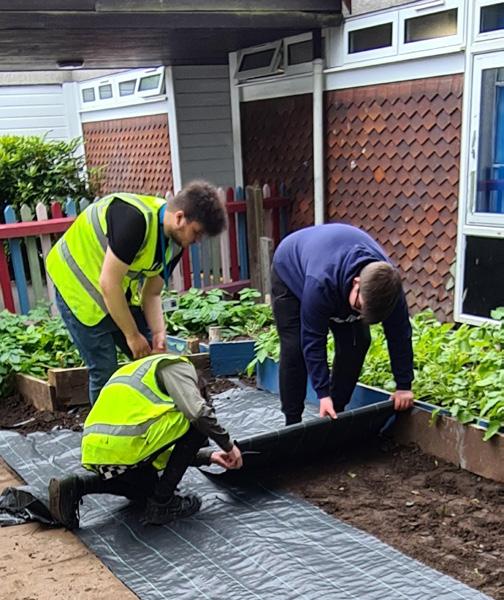

NWSLC is committed to contributing to priorities outlined in regional local skills improvement plans and to national skills priorities by working with employers, providers and local stakeholders including the WMCA, local authorities, and other agencies. This plan is designed to align with the evolving skills requirements at the local, regional and national levels.
To provide high quality teaching, learning and assessment that leads to students having the relevant training and skills to drive up local and regional productivity:
• Providing our students and apprentices with the skills, knowledge, and behaviours to progress to further study or directly into employment.
Measurable outcomes: Conduct four targeted staff development days to enhance key areas of expertise identified in the Local Skills Improvement Plans:
1. Leadership and Management: Workshops and training sessions to strengthen the leadership and management skills among practitioners within their area of expertise.
2. Provide specialised training in digital tools, artificial intelligence, technologies and data literacy.
3. Green skills: Facilitate sessions on sustainable practices, environmental awareness and green technologies.
4. 100% of practitioners to participate in an employer immersion visit, emphasising alignment with the identified priorities for skill development.
Obtain endorsement from an employer or partner sponsor for each curriculum area, specifically related to its sequencing for effective knowledge and skills.
To prepare our students and apprentices for the workplace by giving them the relevant skills and experience they will need by:
Relevant national/regional/ local priority:
• Section 52B of the Further and Higher Education Act (FHEA) 1992.
• Leicester and Leicestershire Local LSIP.
• West Midlands and Warwickshire LSIP.
• Economic growth sectors at national and local levels.
Planned timelines:
• July 2024 to June 2025.
• Building robust industry partnerships across all our programmes to enhance high-quality work experience opportunities.
• Assessing students and apprentices’ skills against best practice globally through our membership of WorldSkills UK Centre of Excellence and embedding skills competitions across all areas of our offer.
• Continuing to implement a robust careers education, information, advice and guidance (CEIAG) program to empower students and apprentices during their transition into the workplace. This program will provide essential information, explore career options, facilitate networking and build confidence.
Measurable outcomes:
1. All Level 2 and Level 3 Education Programmes for Young People (EPYP) students to complete high quality work experience programme.
2. All entry and Level 1 EPYP students to complete high quality experiences of work.
3. All adult and HE students to benefit from at least one module being co-designed by an employer.
4. 100% of students to participate in competition-based activity within their programme of study.
5. 200 students and 50 apprentices to engage in external skills competitions.
6. Hold at least 3 career workshops in each curriculum area.
7. Have at least 3 employer visits / guest lecturers in each curriculum area.
8. Conduct at least 1 workplace immersion visit in each curriculum area.
9. Provide individual career counselling to at least 1000 students.
10. To increase the number of supported internships for students with SEND by 20%.
Relevant national, regional and / or local priority
• Section 52B of the Further and Higher Education Act (FHEA) 1992.
• Leicester and Leicestershire Local LSIP.
• West Midlands and Warwickshire LSIP.
• Economic growth sectors at national and local levels.
Planned timelines:
• July 2024 to June 2025.
To prepare our students and apprentices for the workplace by giving them the relevant skills and experience they will need by:
• Utilising funding acquired through the Skills Injection Fund, we will deliver Higher Technical Qualifications in key areas of development such as:
◌ Healthcare
◌ Engineering
◌ Leadership and Management
◌ Digital and Computing
• Utilising funding acquired through the Shared Prosperity Fund from the West Midlands Combined Authority, we will deliver green leadership skills and sustainable health care bootcamps.
• Continue to deliver bespoke programmes for the mobility sector in:
◌ Electrification and
◌ Software development in automotive
• Delivery of LSIF targets in:
◌ Decarbonisation of transport
◌ Green leadership skills
◌ AI and back office
◌ AI, automation and logistics
Measurable outcomes:
We will assess the successful impact of the intended, current and / or continuing curriculum:
Successful introduction of HTQs:
• Healthcare.
• Engineering.
• Leadership and Management.
• Digital and Computing.
Successful introduction of three skills boot camps:
• Step into Teaching in Leicester.
• Sustainable Healthcare for All in the West Midlands.
• Net Zero for Business in the West Midlands.
Green Skills and Knowledge:
• JLR electrification upskilling programme.
• Electrification upskilling programme for other car manufacturers.
Logistics Skills and Knowledge:
• Apprenticeship Standard: Forklift Truck and Powered Access Apprenticeship.
Construction Skills and Knowledge:
• Apprenticeship Standard: Installation and Maintenance Electrician (King Charles III Green Apprenticeship).
Science and Mathematics Skills and Knowledge:
• A range of courses continue to be delivered for the Multiply agenda.
Digital Skills and Knowledge:
• T Level in Digital.
• T Level Transition Programme in Digital
• T Level Transition Programme in Media.
• Access to Higher Education – Business and Computing
• Higher National Diploma qualifications
– Digital Technologies.
Leadership and Management Skills and Knowledge:
• Apprenticeship Standards: HR Support and People Professional.
• T Level in Business.
• T Level Transition Programme in Business.
• Higher Technical Qualification –Leadership and Management.
• Professional qualifications include CIPD, CPCAB, ATT and ILM.
Advanced Manufacturing and Engineering Recruitment Skills and Knowledge:
• Apprenticeship Standard: Autocare Technician.
• T Levels in Engineering.
• T Level Transition Programme in Engineering.
Health and Social Care Skills and Knowledge:
• T Level Health Care.
• T Level Transition Programme in Health Care.
• Access to Higher Education – Health.
• Higher Technical Qualification in Health Care Profession.
• Higher National Diploma qualifications in Social and Community Care.
• Foundation Degree in Health Care Play.
• BA (Hons) in Integrated Services.
Relevant national, regional and / or local priority:
• Section 52B of the Further and Higher Education Act (FHEA) 1992.
• Leicester and Leicestershire Local LSIP.
• West Midlands and Warwickshire LSIP.
• Economic growth sectors at national and local levels.
Planned timelines:
• July 2024 to June 2025.
Leaders and managers at NWSLC engage frequently and effectively with employers and other relevant stakeholders to understand the skills needs of the local, regional and national economy. As a result, NWSLC’s curriculum is planned accordingly.
Employers and stakeholders are involved successfully in the design and implementation of the curriculum to prepare students for future education, employment or work.
NWSLC leaders and managers are clear how their curriculum contributes to skills needs and ensure that the curriculum is planned and taught effectively, so that students and apprentices learn the skills they need.

I, Professor Ray Linforth have reviewed this accountability statement and local needs duty and confirm that we make a strong contribution to meeting local, regional and national skills needs.

Professor Ray Linforth OBE Chair of Governors

NWSLC Strategic Plan
NWSLC Curriculum Strategy
NWSLC Ofsted Report
West Midlands and Warwickshire Local Skills Improvement Plan
Leicester and Leicestershire Local Skills Improvement Plan
West Midlands Combined Authority Strategic Plan
NWSLC Annual financial statements
